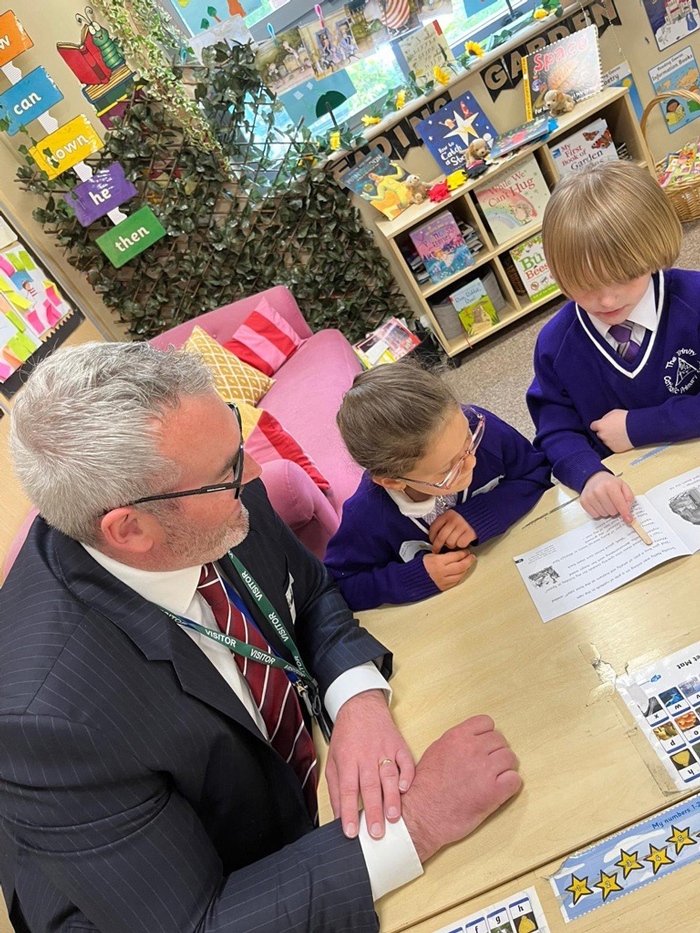The head of a pilot government turnaround trust has compared its work to a “mission to Mars”, using sports-style coaching and a bought-in curriculum to transform struggling schools.
Andrew Truby told Schools Week St Joseph Catholic Multi Academy Trust could provide a new rapid turnaround model, in his first interview since becoming chief executive in January.
The trust, founded by the Archdiocese of Liverpool and Dioceses of Shrewsbury and Chester, is part of a Department for Education pilot to boost church school academisation rates.
It is only the second DfE-launched turnaround trust for “higher risk” schools, after the Falcon Education Trust started in 2019.
Earlier this year, St Joseph welcomed four primaries and two secondaries in Merseyside and Halton, forced to academise after ‘inadequate’ judgments.
The aim is to find a home for “orphan” schools. Schools Week revealed earlier this year 28 “inadequate” schools had no sponsor six months after receiving academy orders.
A recent report argued new “backstop” trusts and better funding could resolve the issue, helping achieve the government’s all-academy vision.
The DfE will evaluate the pilot after two years.
‘The hardest job in Britain’
Truby said one leader called his role “the hardest job in Britain”. He started as the only employee, not only facing tight timescales, but also lacking the typical trust building block of a strong school.
Some that joined had a “lot of underachievement”, he said, while some staff were initially anti-academisation.
But the challenge – and a “blank canvas” – motivated the national leader of education and former executive head of three Sheffield schools to apply.

It marked a unique opportunity – with £1.25 million DfE start-up funding – to build a “MAT from scratch”, based on research.
Truby jokingly compared it to “designing a Tesla”.
“We thought – it’s a mission to Mars, nobody’s walked this path. But OK, this is what the evidence tells us, we’ll put together the best possible plan.”
Truby hired school improvement directors previously at Harris Federation and REAch2, working with heads on a three-year strategy that “might have taken other trusts six years”.
Extensive partnerships include Ark Curriculum+’s materials, Read Write Inc, Ambition Institute, English and Maths hubs, and instructional coaching provision.
‘Just a little progress not enough’
Truby said both Ark’s curriculum and instructional coaching had solid evidence bases. UCL researcher Dr Sam Sims has called the latter the “best-evidenced form of professional development we have”.
More common in sport, coach teachers offer colleagues more detailed suggestions and practice runs than staff typically receive, Truby said.
He claimed St Joseph’s “theory of change” was unusual in overhauling both curriculum and practice. He said many school improvement strategies prioritise one, and some trusts lack well-defined strategies – operating looser, gym-style trust membership where “you pay but don’t have to go and exercise”.
While cultural shifts involve overcoming a “pain barrier”, Truby added: “We’ve got to turn the whole thing around quickly. And if we just make a little progress, children are always going to underachieve.”
While seeking “alignment” on both curriculum and practice can be “contentious” among teachers, he said it saved them work and allowed the trust to guarantee to parents what children get.
Schools not leaving would be ‘nice problem’
Truby acknowledged the model now had to prove itself. Once schools have been turned around, they will be moved out of the trust on to a more permanent home – rather than become internal “capacity givers”.
“The challenge will always be capacity to onboard an unknown number of schools at pace, particularly with the white paper potentially increasing the pipeline.”
But he added: “A nice problem would be schools not wanting to leave, and we wouldn’t necessarily want them to.”
James Forber, head of member school St Chad’s Catholic and CofE Academy, said work had been more collaborative than he initially feared. The trust offered “clear direction” for a school “in and out of special measures” since 2014.
But he added: “If St Joseph is successful, it takes a brave person to disband it and put schools somewhere else.”
















Your thoughts